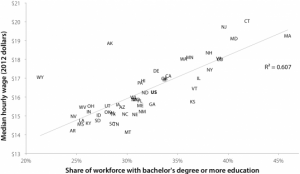A lot of the talk in education reform focuses on teacher quality as the key factor to influence in order to impact student achievement. While teacher quality is important, and other school-based factors also play a role, it is also important to realize that 50% of the factors that determine whether or not a child is successful in school come from OUTSIDE of school. Family, neighborhood, trauma, health, etc. All of those play a role in student success.
So, yes, schools and school systems should focus on factors they can control. I’ve even written about my own ideas on this topic.
But, it also makes sense for schools to build partnerships with organizations and programs that can have a positive impact on the outside of school factors in student achievement.
To that end, I gladly accepted an invitation recently to tour Kirkpatrick Enhanced Option School and hear more about a fairly new (to Nashville) organization called Communities in Schools.
CIS operates in 3 elementary schools (Kirkpatrick, Warner, Ross) and just added a Site Coordinator at Bailey Middle School.
Fortunately for Nashville, the national CIS organization has been around for 35 years and has lots of data on what works (and what doesn’t).
As its name suggests, Communities in Schools seeks to build a community around students in some of the most challenging (economically) schools in the district. Because they know that outside factors influence kids, they are set up to address those factors. The Site Coordinators are typically trained Social Workers who understand the importance of connecting students and their families with services available.
For example, at Ross Elementary at the end of the 2012-13 school year, there were 12 students who had received vision screenings and needed glasses but still didn’t have them. CIS staff worked with a local eye clinic to arrange appointments and help those students get the eyewear they needed. No amount of focus on teacher quality will help if the kids in your class can’t see because they need glasses they don’t have.
CIS is a data-driven organization that sets goals for the students in the schools it serves and then achieves those goals. Yes, they met 25 of 27 performance objectives they set in 2012-13. Items like improving academics and attendance for the students they served.
CIS works in partnership with the schools to set up support services for students and for families. One of the areas where they focus attention is on parent involvement in schools – and at the three sites where they have been working, parental involvement has increased significantly.
Another area of focus is attendance. If a student isn’t at school, they simply aren’t going to learn. And they are going to fall behind. By introducing strategies to promote attendance, CIS has been able to impact and improve attendance (and mitigate chronic absenteeism) at the schools it serves.
I walked away from an hour at Kirkpatrick impressed with the dedication and commitment of CIS staff to the success of the students at the schools they serve. The ability to connect families to resources and to help children meet their specific needs lifts a burden from teachers and school staff and strengthens the school community.
It truly takes a community to make a school work. CIS-TN is making that happen in a small corner of Nashville. It’s a success story that deserves to be continued and expanded.
